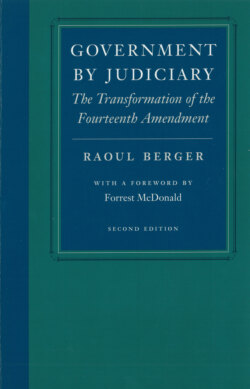Читать книгу Government by Judiciary - Raoul Berger - Страница 10
На сайте Литреса книга снята с продажи.
ОглавлениеPreface to the Second Edition
The publication in 1977 of Government by Judiciary provoked a storm of controversy, leading a critic to exclaim in 1983 that “refuting Raoul Berger has become a cottage industry.” 1 Criticism flourishes unabated. A critic more candid than most observed that
Berger has forced all serious constitutional theorists to deal with questions regarding the proper principles of constitutional interpretation and the proper role of the courts, questions that many theorists, basking in the glow of Warren Court decisions on individual rights, felt content to ignore.2
Each critique prompted me to reexamine and retest my conclusions, for scholars are apprehensive whether they have overlooked a fact that will explode their inferences. “The great tragedy of science,” Thomas Huxley remarked, is “the slaying of a beautiful hypothesis by an ugly fact.” 3 In the eighteen years since publication, I have indited forty-odd responses, in which each respective critique is examined in great—and, I am afraid, tedious—detail. The interested reader will find a bibliography of my responses at the end of the book.4
These critiques prompted me to preserve the original text in this second edition so that readers may in the future have before them what excited so much controversy. The materials that have accumulated since 1977 are set forth in greatly abbreviated form as a supplement to a relevant chapter. New material added to the footnotes of the original text is identified by brackets.
A word in extenuation of the profuse quotations. Since my views have been and remain under assault, I prefer not to rely on mere expressions of my opinion but to employ appraisals by others.5
This revision was completed in my ninety-fifth year, so the gentle reader should cast upon it a charitable eye, bearing in mind Dr. Johnson’s remark about “a dog’s walking on his hind legs. It is not done well; but you are surprised to find it done at all.” 6 Finally, I am indebted to the Earhart Foundation for a grant that facilitated completion of this second edition.
Raoul Berger
Concord, Massachusetts
1996
